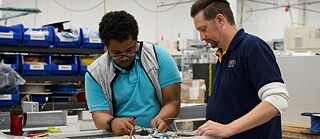Auslandsstudium in Deutschland
U.S.-American Students in German Universities
In der Regel keine Studiengebühren und immer mehr englischsprachige Studiengänge: Deutschland rangiert bei Studierenden aus den USA inzwischen unter den fünf beliebtesten Ländern für ein Auslandsstudium.
Diese Folge anhören: Apple Music | Spotify | Download
Diese Folge stammt von Marguerite Moritz. Marguerite ist Autorin, Filmemacherin und Dozentin aus Boulder, Colorado. In diesem Podcast unterhält sich Marguerite mit jungen Menschen aus den USA, die an deutschen Universitäten studieren, mit ehemaligen Auslandsstudent*innen sowie Hochschullehrkräften. Die Musik in der Folge „Just a Smile“ stammt von Keith Anthony Holden und ist lizensiert von Audioblocks, „Liptis“ von Blue Dot Sessions ist lizensiert über CC BY-NC 4.0. Als Editorin unterstützte Emilie Johnson die Produktion.
Transkript
[PIANO MUSIC PAYING]
Hana Schneider: I always just wanted to come study in Germany. [AIRPORT ANNOUNCEMENT: “WELCOME TO FRANKFURT”] I’ve always loved the language; I’ve always been very interested in the history.
Garrett Widener: I’ve been in Berlin living and studying for three years now.
Alex Truesdale: Everything you can imagine exists here. You don’t even have to do anything, necessarily, to be amongst this sort of pulsating life.
Sujin Shin: The art library is here where I do a lot of research. Around the corner is the Philharmonie — the Berlin philharmonic — which is like, one of the best orchestras in the world.
[MUSIC PLAYING]
Marguerite Moritz: Hana Schneider, Garrett Widener, Alex Truesdale, and Sujin Shin. Four young Americans drawn to different aspects of German culture, but sharing the common goal of getting an education. That’s something more and more U.S. students are doing and, in this podcast, we’ll find out why. I’m Meg Moritz, a journalist and educator based in Boulder, Colorado. And before we meet those students and hear their stories, some background on just why more and more Americans are studying in Germany.
[VOICE: “GOOD MORNING TO ALL. THIS IS THE LARGEST REGISTRATION WE’VE EVER HAD FOR THE OPEN DOORS PRESS CONFERENCE.”]
Marguerite Moritz: Open Doors tracks international student mobility, who comes to the U.S. to study, and where Americans go when they study abroad. Increasingly they’re going to Germany, now a top five destination for American students. Rajika Bhandari is a research director for the Open Doors report.
Rajika Bhandari: Many countries are now in the game of trying to recruit large numbers of international students and many of them have set very ambitious targets. Germany some years ago declared a recruitment target of tracking 350,000 international students by 2020. Well, just last year they declared that they had already exceeded that target. And I should say, it’s not just American students, but actually we’re seeing international students from around the world are being drawn to Germany.
Marguerite Moritz: For one thing, higher education in Germany is free. There’s no tuition. In addition, more and more courses are offered in English.
Rajika Bhandari: Financially and economically, it is offering a tremendous value to American students, especially when you compare the very high and continuously escalating costs of a U.S. higher education credential. And now, in fact, there are entire master’s level programs that are taught entirely in English.
Marguerite Moritz: So, what does it take for an American student to get into a German university? And what happens once they do? I went to Germany hoping to find out.
In Karlsruhe, I met Hana Schneider at her Sunday roller derby practice with the Karlsruhe rock and rollers. [SOUNDS OF DERBY PRACTICE] Hana’s paternal grandparents came to the U.S. from this part of Germany. Her first trip here was at age nine. In high school she took German language classes [HIGH SCHOOL CLASS TEACHER IN GERMAN: “WAS IST HEUTE? HEUTE IST DIENSTAG.”] And passed a proficiency test. Now, she’s in Germany on a traditional undergraduate study abroad exchange.
Hana Schneider: I grew up listening to my Oma’s stories, and you know, every year on Christmas, we do the German Christmas, so we’d have a ‘Fleischball,’ so just a bunch of meats and cheeses and breads, and she decorated our house every Christmas with all the German Christmas decorations, she made her German cookies. My favorite food when I was a kid, was ‘Maultaschen,’ which is a Southern German like, specialty. And just — I’ve always been a fan of Germany altogether. Ever since I was a kid, I always rooted for Germany in the world cup. I was like, “Go, Germany.”
[FANS CHEERING FOR GERMANY]
Hana Schneider: I think the first trip really was what got me interested in Germany but I’ve always had the interest in Germany as a whole because of my family background.
Marguerite Moritz: While she’s studying here, her counterpart is at University of Northern Colorado in Greely. Hana pays her usual fees and tuition to UNC. Her course work in Germany will count toward her Colorado degree.
Hana Schneider: I just went to the international office at my school. They have the exchange with the ‘Pädagogische Hochschule,’ so it’s like one for one exchange thing, one of their students came to UNC. And I came here.
[CLASSROOM NOISES]
Hana Schneider: I have three lectures that are taught primarily in German and I do my best in them. I typically understand what’s going on. My weak point is definitely my own speaking ability and especially my writing ability.
Marguerite Moritz: According to Hana, students can manage even if they haven’t studied German.
Hana Schneider: I actually have a friend who also studies at UNC, who is in Eichstätt at the moment. When — he spoke no German when he came here, he had never been out of the country. He had definitely had his challenges, but he has really done really well in like, figuring it out — and he’s definitely getting a handle on the language, from what I can tell. When he came to visit me, he was able to order food and whatever basic sentences you really need to survive. So, I think it’s very easy to be a non-German speaking student and get by. And almost every university, I believe, has some sort of language program that will help non-speakers. And as obviously the world becomes more online, and people use social media more, and they watch youtubers in English, TV and movies in English ... it’s a kind of like a blending of languages.
Marguerite Moritz: What is your sense of the system that allows for essentially free higher education?
Hana Schneider: I’m very much in support of a system that moves toward free education. I don’t believe that education should be something that you go into years of debt over. They have capitalized on the education market so much in our country. I don’t know if free education is necessarily the solution, but I definitely think it’s a step in the right direction, at least to get us to a better place as a country.
Marguerite Moritz: As for her social life, she spends time with her derby teammates and an international group of students now considered close friends.
Hana Schneider: It’s so cool to know so many people from around the world. I celebrated my 20th birthday back in October with my whole international group, and when it hit midnight and my birthday came, every single person in the group sang happy birthday to me in their own language.
[GERMANS SINGING HAPPY BIRTHDAY]
Maguerite Moritz: Like Hana Schneider, Garrett Widener did an undergraduate study abroad program. But after completing his U.S. degree in psychology, he moved to Germany full time and got a job teaching English. We met at a Berlin café near his classroom. [SOUNDS OF CAFÉ]
[GARRETT ORDERS AN ESPRESSO]
Marguerite Moritz: First drawn to Germany as an exchange student with a love for techno, Garrett returned for a boyfriend and a vibrant urban culture.
Garrett Widener: It was a combination of me meeting someone very special and me not wanting to be in the U.S. anymore.
Marguerite Moritz: Eventually, Garrett realized that his job teaching English didn’t really suit him long term.
Garrett Widener: I was completely bored. So, I thought I can go back to university. It’s basically free. I applied and they basically told me having an American bachelor’s degree is not equivalent to a German bachelor’s degree. In the U.S. we take a Jungian approach to education with a little math, a little bit of literature, little bit of art and science. But in Germany if you study psychology, you strictly study that one subject for three years.
Marguerite Moritz: So, Garrett started picking up the needed courses and studying German language intensively.
Garrett Widener: I studied every day for three hours a day for about nine or 10 months. I dedicated a lot of time to it. At this point, I’m completely comfortable. I’ve been giving presentations in German for the last two years now which is a very big thing here.
Marguerite Moritz: He’s now working on his undergraduate thesis. And the good news: he can write it in English.
Garrett Widener: The international language of psychology.
Marguerite Moritz: Once his thesis is complete, he’ll start his master’s program at Humboldt — the oldest of Berlin’s four universities. For Garrett, Germany is providing an education in more ways than one.
Garrett Widener: I’ve just struggled with the idea of living and working in the U.S. as a whole when I was not really fully behind a lot of what was / is going on there. Now I feel a big sense of peace, a big sense of satisfaction, living here.
Sujin Shin [IN GERMAN]: Hochrenaissance und Barock in der europäischen Malerei des 16. und 17. Jahrhunderts.
Marguerite Moritz: Which means?
Sujin Shin: High Renaissance and Baroque Painting in Europe in the 16th and Centuries.
Marguerite Moritz: Sujin Shin’s undergraduate degree from Brandeis was in language and literature. But she also had an affinity for art, and her choices for a topnotch graduate program came down to an expensive, unaffordable option in the U.S. or a program in Germany.
Sujin Shin: I came to Berlin in early 2015, solidified my German here and applied to Humboldt.
Marguerite Moritz: Like Garrett, she also had to make up some undergraduate course work, but hermaster’s program is entirely in German so she also had to demonstrate strong language skills.
Sujin Shin: The most important thing to do was to pass this exam, the test ‘DaF.’ You got to pass that exam at least.
Marguerite Moritz: For Sujin, adjusting to life in Germany has had its challenges.
Sujin Shin: My parents are Korean. They immigrated to the U.S. I was born and raised there. I do have a strong connection to Korean culture and language. I speak it with my parents. In Berlin, I haven’t really found a community of Koreans — that I did have and miss from where I’m from in New Jersey. I do feel extra foreign, if I can say that. I try as hard as I can to really learn the language and be able to communicate. But still, there are things that remind me all the time that I’m a foreigner, and that I’m Asian, especially. For example, I’m in a choir at Humboldt and I’ve been in this choir for a year and my name on the list has been spelled so incorrectly I couldn’t find myself. I’ve also been confused for another Asian girl in my choir many times. I’ve been there for over — for almost over a year now. They should recognize me.
Marguerite Moritz: As to her studies, Sujin gives high grades to the quality of both the U.S. and the German system, but there are significant differences.
Sujin Shin: In America, I feel like your grades are more weighted between several different assignments and finals and midterms etc. In Germany, your grades depend on one exam.
Marguerite Moritz: She finds German professors more formal than their U.S. counterparts, and she says the German system requires students to take more responsibility for their own learning. As for Germany’s no tuition education, she says it’s not just helping students.
Sujin Shin: By allowing students to have an affordable education, I feel that they are attracting smart people, creatives as well, to build a society that’s better.
Marguerite Moritz: It’s a society she intends to be part of, now and in the future.
Sujin Shin: There is no separating me now from my experience in Germany. I love the language, I wanna keep using it for the rest of my life — it has really shaped who I am today and what I want to do in the future.
[ALEX TRUESDALE ORDERS COFFEE AT CAFÉ]
Marguerite Moritz: Just a few years ago, Alex Truesdale was getting an undergraduate degree at the University of Colorado in Boulder and working at a local café. Germany was nowhere on his radar screen, but then:
Alex Truesdale: This girl came in and she was kind of cute.
Marguerite Moritz: That girl had just done a study abroad program in Regensburg, and when she and Alex started dating, Germany was high on their list of things to explore together.
Alex Truesdale: We decided to look for internships.
Marguerite Moritz: The relationship faded, but Alex’s attraction to Germany did not. He took a semester off to work in Berlin, take language classes, and develop a network of friends.
Alex Truesdale: That’s when the magic happens. It’s when you finally start settling into your own skin in a new place.
Marguerite Moritz: After returning to the U.S. to finish his undergrad degree, Alex started looking for a graduate program.
Alex Truesdale: It just seemed insane to me, if I had the ability to apply to schools where I might be able to A. Have a cultural experience; B. Here, stay in a place that I like with my friends that I had made here; and C. Not pay $30,000 for a two year grad degree. It would be irresponsible of me not to try to do that.
Marguerite Moritz: Having a degree program in English was crucial, and the German system was making that possible.
Alex Truesdale: My German is getting better, but by no means did I feel confident enough to do an entire degree. So, I consider myself lucky because IT degrees always tend more toward English because that’s the industry language.
Marguerite Moritz: Do you try to maintain some kind of connection to the U.S.?
Alex Truesdale: A lot of my friends here are much more interested in American politics than I am. Which is a bizarre feeling. They can tell me everything that I don’t know about my own country. Then there’s the cultural thing, is interesting, because it’s ubiquitous. American culture in one way or another, is everywhere and it’s quite strong here, and that allows you to also self-select which bits of American culture you want to connect to. And in that regard, I have kind of a curated idea of home in my head that may or may not be real. Just like a collection of bands that I like or the podcasts that I listen to, and I can decide what I do and don’t want to consume, which is a luxury. This basically means I get to paint the United States of America in whatever colors I choose.
Marguerite Moritz: Alex’s advice for other students:
Alex Truesdale: The key ingredient is just wanting to do it. With a real commitment, you will find the people who can point you in the right direction. I think, there’s a lot of opportunity here.
Marguerite Moritz: Next stop for Alex: looking for his own flat in his favorite Berlin neighborhood close to his favorite cafe. And next stop for me: Ludwig Maximillian University in Munich, where I met Robin Eisenreich, head of International Admissions at one of Germany’s top universities.
Robin Eisenreich: The most important thing is that our programs are taught English language. We have 27 English-taught master’s programs and this number is increasing — and we have a very high number of international and U.S. students. For example, we have a new master’s program since 2016. It is called data science, and in this program we have 90 percent international students. The second point is that the program is free.
Marguerite Moritz: But just why are German universities opening their doors to students from the U.S. and around the world?
Robin Eisenreich: The labor market has become more and more global and international. We have two percent unemployment and many international employers like BMW, Alliance, Seimans. It’s very important that we have international people in the labor market to have the best ideas.
Marguerite Moritz: Eisenreich estimates that 20 to 30 percent of international students stay in Germany after their studies. That is facilitated by an array of internships and placement programs. More English language degree programs are planned, although not everyone is in favor.
Robin Eisenreich: The professors, they are here about 10 or 15 years. They have been always teaching their lectures in German language. And when we, the International Office, write them letters asking to please offer your program in English language, they won’t do this. They say, we have always used German language. So, it’s not easy.
Marguerite Moritz: And for that issue there is also a plan: hiring English speakers like geophysics professor Stu Gilder, born and educated in the U.S. and brought on board to work with grad students, even though he spoke no German at the time.
Robin Eisenreich: It’s an international master’s program, so by definition it is in English. So, when we write grants, we can also write them in English. You can imagine being in America and having the possibility to write a grant in Spanish or Chinese — here it’s accepted. If I was to be a boss and I was to think about somebody who went to a new system and learnt a new culture, and did it essentially for free — or maybe it was expensive to move to that place, and a big learning curve, but you’ll become much stronger from it in the long run.
Marguerite Moritz: That’s something Carsten Zorger confirmed when we met at Deutschland Radio, where he heads a digital radio initiative. I first met Mr. Zorger more than 30 years ago when he was a study abroad journalism student in Boulder.
Carsten Zorger: It was the most important year of my life. I got an education that I would never have been able to get in Germany at that time. In Boulder, Colorado, there was a journalism school with all the different faculty members, TV, radio. This was like a honeypot for me. I could go where the knowledge was and is, I can seek my talent, I can find my interests and I can finally — and most importantly — learn a system of values and techniques that still are prevalent today for my work. I was seeking a good education and that’s what I got. I still live from that, whatever I learned, I still use it every day.
Marguerite Moritz: And that’s my takeaway. If you can manage to leave home to study in another country, you probably won’t know the future benefits until years or even decades later. But you can be almost certain — the experience will help shape your life. I’m Meg Moritz reporting.







